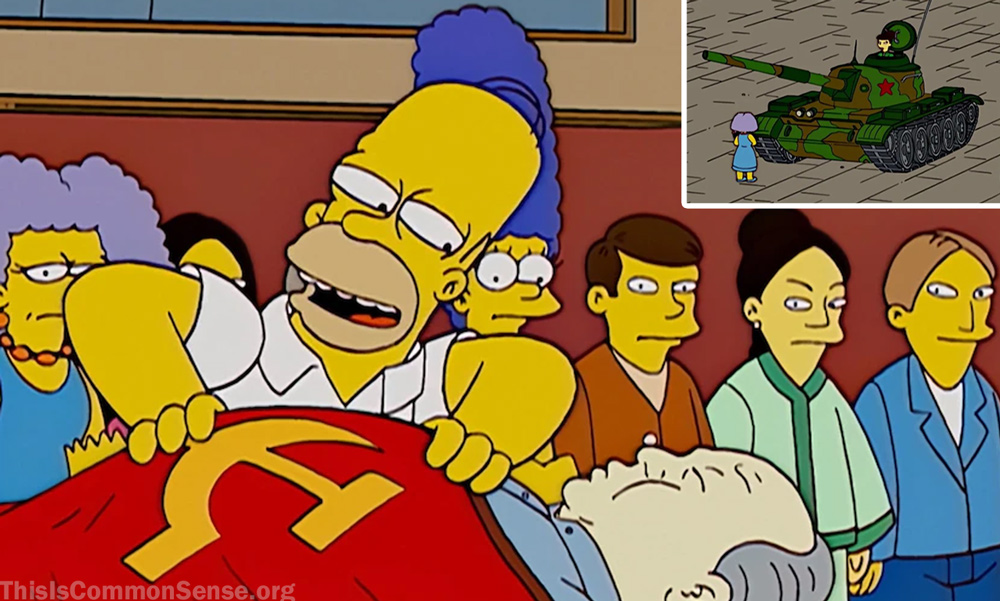China’s leaders fear Winnie the Pooh.
And The Simpsons.
The totalitarian regime’s opponents liken Xi Jinping, the latest Dear Leader, to Winnie the Pooh — due to an obvious resemblance. So Xi’s government works hard to expunge Winnie images.
The Chinazis also want everyone in China and Hong Kong (not to mention across the universe) to forget the Tiananmen Square massacre of 1989, when hundreds or thousands of people demanding democratic reform were killed.
The Walt Disney Company is eager to cooperate with this besieging of memory.
The Simpsons is part of its new streaming service in Hong Kong, where citizens have been losing the last remnants of political freedom permitted under the two-systems agreement of 1997. Whether preemptively or in compliance with instruction from the Chinese government, Disney has deleted a certain episode from the series’ archive available to Hong Kongers.
In the memory-holed episode, “Goo Goo Gai Pain,” Homer, presiding over the corpse of Mao, opines that Mao is “like a little angel that killed fifty million people.”
Another character has a stare-down with a tank, recalling the briefly effective “tank man” confrontation with a row of tanks in that fateful June of 1989.
The episode also satirizes the Chinazi determination to erase all discussion of Tiananmen. For instance, the Simpsons see a sign at Tiananmen Square announcing “on this site, in 1989, nothing happened.”
Instead of appeasing Xi’s government, what should Disney do?
What anybody who is paid to help repress a people and blank out the past: Stop doing that.
Forfeit the money.
Stand up for human rights.
Or lose them.
This is Common Sense. I’m Paul Jacob.
See all recent commentary
(simplified and organized)
See recent popular posts

4 replies on “Disney’s Memory Hole”
More and more the core values of those who embrace capitalism place profits before people. Traditional core values which sprang from religious beliefs and traditions are being jettisoned around the world in favor of profits. Absent core values, capitalism thrives in a totalitarian environment where control can be optimized. China of course is the poster child. The WTA has the opportunity to reestablish traditional core values at the heart of their business model. Let’s hope they are able to see this through and strike the match to resuscitate business ethics in the West.
The question that we must ask is of what our relationship should be with Disney, given their relationship with the Chinese state. Since Disney is in a business of ideas, that question seems more pressing than that of our relation with businesses that buy and sell everyday physical substances as such or material objects as such.
Well said Daniel! We as consumers have the ultimate power, but from the remote vantage point of our keyboards, its hard to imagine a meaningful plan of action. At the very least we can choose to forsake any benefits we derive from our consumer relationship with Disney in protest of their profit centric stance. What are your thoughts on how to mobilize public sentiment to affect change at Disney?
What kind of pathetic excuse for a human being is so frightened of a cartoon character that he uses the force of government to ban it? The Chinese leader thugs give new meaning to “thin skinned”.